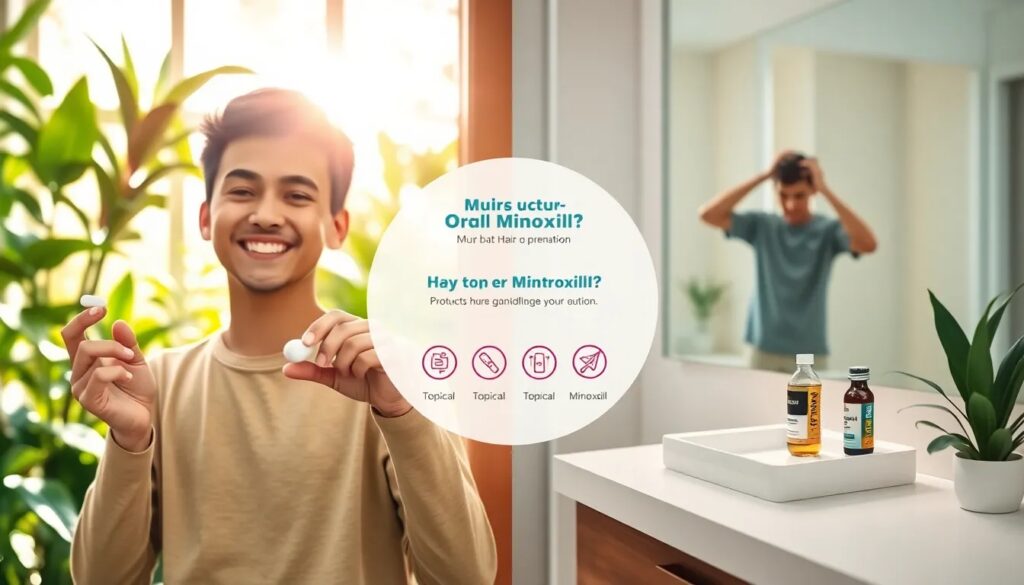As many people seek effective solutions for hair loss, the debate between oral minoxidil and its topical counterpart has gained significant attention. Understanding which form offers better results is crucial for individuals considering their options.
This article explores the effectiveness, side effects, and benefits of both oral and topical minoxidil, helping you make an informed decision about your hair loss treatment.
What Is Oral Minoxidil And How Does It Work?
Oral minoxidil is a medication that was originally developed to treat high blood pressure. However, it has gained popularity for its effectiveness in promoting hair growth, particularly in patients with androgenetic alopecia.
When ingested, oral minoxidil works by widening blood vessels, which improves blood flow to hair follicles. This increased circulation helps to nourish and stimulate hair growth, leading to thicker and healthier hair.
Typically, oral minoxidil is prescribed in lower doses compared to its original use for hypertension. Patients have reported significant improvements in hair density and thickness, making it a viable alternative for those who may find topical treatments less effective or inconvenient.
How Does Topical Minoxidil Compare To Oral Minoxidil?
Topical minoxidil, commonly known by the brand name Rogaine, is applied directly to the scalp. This method allows for localized treatment, which can be beneficial for targeting specific areas of hair loss.
In recent studies, comparisons between oral and topical minoxidil have shown that both forms can be effective. However, some notable differences exist:
- Application method: Topical minoxidil requires daily application, which can be cumbersome for some individuals.
- Systemic absorption: Oral minoxidil is absorbed into the bloodstream, potentially offering a more uniform effect across the scalp.
- Results: While some studies indicate that topical minoxidil may provide better photographic results in hair density, oral minoxidil has shown substantial improvements in hair diameter.
The choice between these two formulations often comes down to personal preference and lifestyle considerations. Is oral minoxidil better than the topical version? It depends on individual responses and treatment goals.
You may be interested in reading: Are gummy vitamins effective for female hair loss?
Are gummy vitamins effective for female hair loss?What Are The Side Effects Of Oral Minoxidil?
As with any medication, oral minoxidil comes with potential side effects. Common effects may include:
- Hypertrichosis, or excessive hair growth in unwanted areas.
- Edema, which refers to swelling due to fluid retention.
- Increased heart rate.
It’s important to note that while side effects can occur, many patients tolerate oral minoxidil well. Regular monitoring by a healthcare provider can help manage any adverse effects and ensure patient safety.
Can You Use Oral And Topical Minoxidil At The Same Time?
The combination of oral and topical minoxidil is a question many patients ask. While both forms can be effective individually, using them together may enhance results for some individuals.
Consulting with a healthcare provider is crucial before combining treatments. They will consider factors such as:
- Your overall health and medical history.
- Current medications you are taking.
- Specific hair loss patterns and treatment goals.
Combining oral and topical minoxidil may offer a comprehensive approach to managing hair loss, but ensuring it aligns with your health profile is essential.
What Are The Benefits Of Oral Minoxidil Over Topical?
Oral minoxidil presents several advantages over its topical counterpart:
- Convenience: Taking a pill can be easier than applying a topical solution daily, especially for individuals with busy lifestyles.
- Wider efficacy: Oral minoxidil may promote hair growth more effectively across the entire scalp, not just specific areas.
- Reduced scalp irritation: Those who experience irritation from topical treatments may find oral minoxidil a better option.
These benefits make oral minoxidil an attractive alternative for many looking to combat hair loss.
Is There A Difference In Efficacy Between Oral And Topical Minoxidil?
Research suggests that both oral and topical minoxidil are effective for hair growth, but results may vary between individuals. Some studies indicate that:
You may be interested in reading: Are low-level laser therapies effective for hair growth?
Are low-level laser therapies effective for hair growth?Oral minoxidil may lead to faster results due to its systemic absorption, while topical minoxidil may show more localized effectiveness. However, patient satisfaction ratings are high for both forms, with over 60% expressing satisfaction with their results.
Ultimately, the best choice depends on personal preference and individual response to treatment. If you’re considering switching to oral minoxidil, consult your physician for guidance.
What Should You Know Before Switching From Topical To Oral Minoxidil?
If you are contemplating a switch from topical to oral minoxidil, there are several important factors to consider:
- Consultation with a healthcare provider: A thorough evaluation will help determine if oral minoxidil is suitable for you.
- Understanding the dosage: The recommended dosage for oral minoxidil typically starts low and may be adjusted based on effectiveness and tolerance.
- Monitoring side effects: Be aware of potential side effects and report any adverse reactions to your doctor promptly.
Transitioning to oral minoxidil can provide benefits, but it’s essential to approach this change with adequate knowledge and professional support. Remember to evaluate the specific advantages of low-dose oral minoxidil as well, as many studies highlight its safety and efficacy.
In summary, understanding the differences between oral minoxidil and topical minoxidil is key to finding the right hair loss treatment for you. Always consult with your healthcare provider to explore your options and ensure the best possible outcomes for your hair growth journey.
I invite you to explore all the available options for hair loss treatments near you.
You may be interested in reading: Is hair regrowth common after alopecia areata?
Is hair regrowth common after alopecia areata?

Leave a Reply